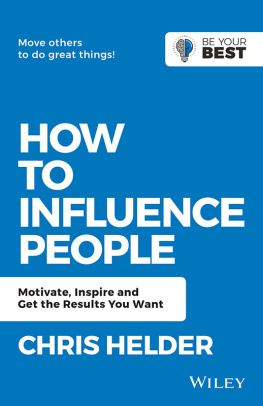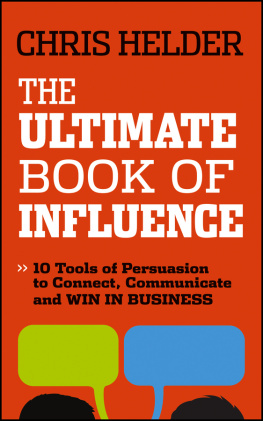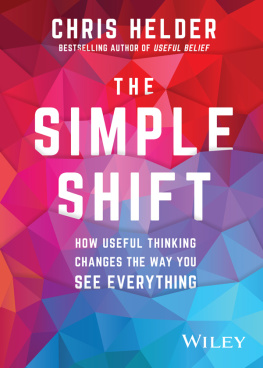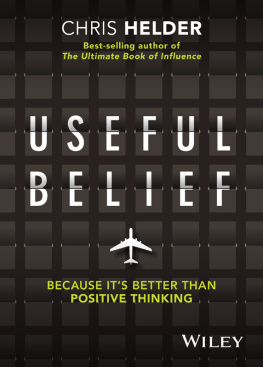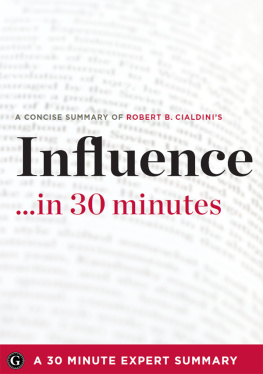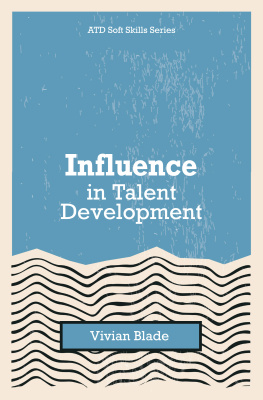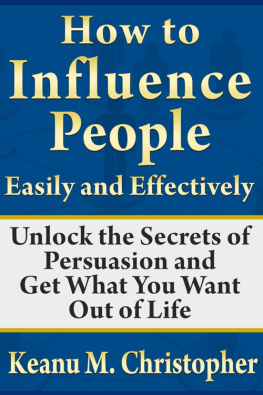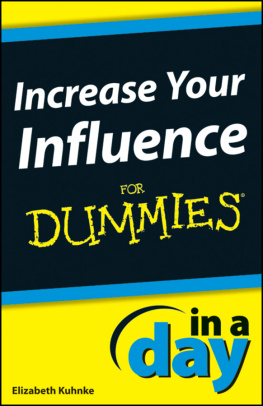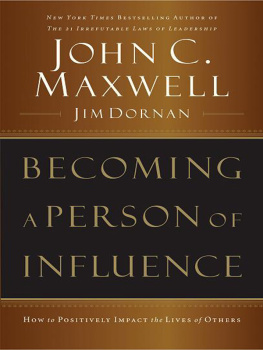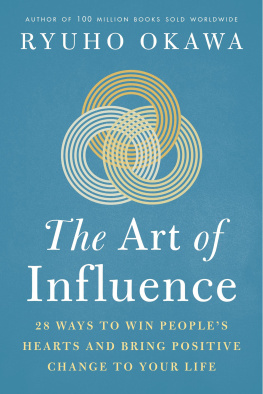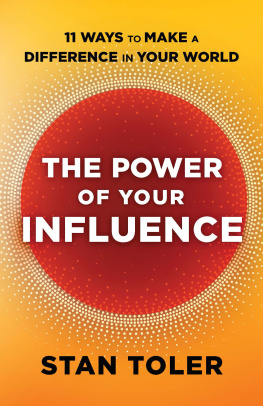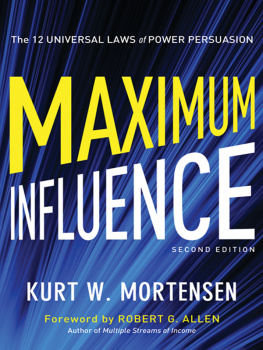

HOW
TO
INFLUENCE
PEOPLE
Motivate, Inspire and
Get the Results You Want
CHRIS HELDER
First published as The Ultimate Book of Influence in 2013 by John Wiley & Sons Australia, Ltd, 42 McDougall St, Milton Qld 4064
Office also in Melbourne
This edition first published in 2019 by John Wiley & Sons Australia, Ltd
Helder Consulting Pty Ltd
The moral rights of the author have been asserted

All rights reserved. Except as permitted under the Australian Copyright Act 1968 (for example, a fair dealing for the purposes of study, research, criticism or review), no part of this book may be reproduced, stored in a retrieval system, communicated or transmitted in any form or by any means without prior written permission. All inquiries should be made to the publisher at the address above.
Disclaimer
The material in this publication is of the nature of general comment only, and does not represent professional advice. It is not intended to provide specific guidance for particular circumstances and it should not be relied on as the basis for any decision to take action or not take action on any matter which it covers. Readers should obtain professional advice where appropriate before making any such decision. To the maximum extent permitted by law, the author and publisher disclaim all responsibility and liability to any person, arising directly or indirectly from any person taking or not taking action based on the information in this publication.
Foreword
The business world does not have an information problem! We are one Google click away from a lifetime of information about any topic we can think of. We have more information than we can possibly need, in fact we are drowning in it. What we have is an implementation problem. I see this in the business world every day. We have meetings where people spend an hour saying nothing tangible and everyone walks out and things stay the same. People go to conferences see amazing speakers, have insightful brainstorming sessions, yet go back to work and forget all of it after dealing with 530 emails.
Approximately 76 per cent of all change efforts in organisations fail and 65 per cent of all strategy is never actioned. The reality is people dont implement the things they learn: they just keep following the same behaviour patterns over and over again. Why? Most of the information we receive requires us to break it down and make it relevant and we are simply too busy and tired to do this.
I first saw Chris Helder when he was running a full-day workshop on influence and sales. I was immediately struck by his facilitation skills and masterful use of comedy. However, as I watched him present I was stunned by his ability to take concepts, break them down into first principles so that they became practical and easy to implement. He gave the group a suite of tools that they could walk out of the room and implement the very next day. They didnt need to have more meetings or do more research: they could do it there and then. In fact when I touched base with his client he said that on the Monday morning following the conference he could hear his team use Chriss techniques and they saw immediate results. Anyone can make a concept complicated: a true genius takes something complex and distils it to make it simple.
I was so impressed by his presentation that I asked Chris to personally mentor me on sales and influence. My business was immediately changed and I still use his techniques today. Just quietly, some of them I use at home too (dont tell my wife that). Breaking down the e-wall was a revelation to me and saved my business so much time and effort. Sunsets made me look at my life differently and altered my behaviour, particularly in my personal life. Positive, positive, positive negative is a technique that I not only use in sales and my presentations, but also in my parenting style.
In this world of inaction, Chriss work is a breath of fresh air. It just works. It is universal and leads to better outcomes. Enjoy this book and marvel at the complexity in his simplicity.
Dr Adam Fraser, author of The Third Space
About Chris Helder
Chris Helder is a communication expert and master storyteller whose presentations have radically transformed how thousands of people worldwide communicate with clients, customers, colleagues, family, staff and teams. He has been a professional speaker for 17 years and has given some 2200 presentations around the world.
He is the author of three Wiley best-selling books:
- The Ultimate Book of Influence (2013)
- Useful Belief (2015)
- Cut the Noise (2017)
Chris speaks at conferences in the areas of communication, mindset, human potential, leadership, customer experience and, of course, how to influence other people.
Introduction:
the new reality
Do influence skills matter today?
How important is face-to-face influence in a world of email, text messaging and social media? Clearly influence has changed. But is it still as important as it used to be?
The way that business and sales are done today is without a doubt different from the way it has ever been before. Businesses and brands are embracing the digital age. They are using electronic communications and social media more than ever to promote and sell. We live in a world where decision makers are online and contactable 24 hours a day and seven days a week. Being out of the office means nothing any more, as workers engage in a new era of trying to find balance between work and life.
So why then has the ability to influence a sale or an idea often become harder? Why has the timeline to get a contract signed stretched out for so many businesses? This is primarily due to three reasons:
- The customer in business today is being protected by what I refer to as the electronic wall or, more simply, the e-wall. As its name suggests, this is a virtual wall of email and social media behind which your clients can now delay or procrastinate the decision process involved with a sale or a proposal. This, of course, leaves the business development experts unable to use their face-to-face influence skills in order to close the deal.
- The person presenting the proposal also hides behind the e-wall. It is often easier to just send an email than force the issue to actually create an environment where face-to-face influence can take place. This leads to an extended game of e-pong, which I will explain in the first part of this book. Either way, timeframes for closing deals blow out and often the business is missed simply because there was no leverage created by actually meeting with the decision makers.
- People are not as good at face-to-face influence skills as they used to be. The pattern of communication has become less about face to face, and it is now acceptable to do business via email. Dont get me wrong we all need to embrace the digital age. It has provided our world with an unprecedented level of access to communication at the touch of a button. However, face-to-face influence skills have not become redundant. In fact, they are more important than ever if we are to learn how to break down the e-wall.
Next page
